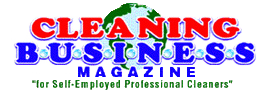Training for Sales and Estimating
Two of the more difficult positions to fill and train for in a cleaning business or any type of service operation are the salesperson and estimator.
Not everyone agrees as to what type of a background is needed or most advantageous to have when it comes to finding someone to fill these positions. Some will say; if a person knows how to run the numbers and can learn a computer program they can bid, estimate and workload cleaning accounts. The same can be said about sales; if a person has a silver tongue, handles themselves professionally and knows a few buzz words and follows the basic concepts of how to close a sale, they can sell cleaning services. I disagree. In my experience, the best sales people and estimators, not only have the above listed skills, but also have experience in the cleaning, maintenance or property management field.
On the surface, selling and estimating may appear to be a simple matter, however when you dig into it, you find that there are many variables that impact the end result. An almost endless list of details need to be taken in to consideration when responding to customer concerns and estimating costs for labor, supplies, overhead and profit.
Unless you can find someone with specific cleaning industry experience in sales and estimating, you are going to have to provide some training and support before the person can truly work on their own. Even if someone has experience, it’s a good idea to have them work with you or someone else in the company for a while just to make sure that their past experience is a match with your company values, processes and pricing.
A salespersons job is to convince others to agree with their point of view. They can use this same technique on a potential employer as well as a customer. You can’t afford to have a newly hired salesperson out in the community saying or doing the wrong things with your existing or potential customers. A bad sales person can do a tremendous amount of damage to your personal and company reputation in a short period of time. Years of hard work can get trashed in a few weeks by a smooth talking or dishonest salesperson. The same is true for the person doing the bidding and estimating, you need to keep a close eye on the numbers and double check everything. Bidding and estimating is your bread and butter and being a few cents off on a large account, could mean you won’t get the job or you could end up losing money instead of turning a tidy profit. Don’t take chances with these critical aspects of your business. Keep your eyes and ears open, and don’t believe what you hear, look for validation via results.
An Effective Training Process
You have multiple options when it comes to training a salesperson or estimator. My preferred approach is to personally work with the individual for a week or two and then at least once a wk from then on for several months. This takes time, but this is no place to cut corners. It is critical to verify that you and the person you are training are on the same page. If you work for a larger company, not all the training and monitoring needs to be done personally by you. If you have other salespeople or a sales manager who can handle the training and will supervise the new hire, it would be appropriate to have this person handle most of the training. Either way, keep a close eye on the new hire via daily or weekly meetings as well as written reports.
When it comes to training an estimator, the same approach is recommended. Someone needs to know what the person is doing with their time each day and all bids and proposals need to be reviewed for accuracy before being sent to a prospective customer.
If the new hire doesn’t have experience bidding, they will need to work with someone experienced staff to learn your processes and rates. Having a new hire review previous bids is a good way to start, as previous bids can often be used as a template for future bids. A newly hired person could be assigned to work on small parts of bids to begin with. Examples would be to have them run the numbers on cleaning restrooms, floor or carpet care and then compare their estimates with your own or that of others in the company who have experience bidding accounts. Another option is to have the new hire work primarily on smaller accounts for a while until you are gain confidence in their numbers and calculations. Dealing with smaller accounts removes some of the risk because if they screw up, the damage won’t be a bad as if they had been bidding on a larger more complex accounts.
The Bottom Line
There is no iron clad way that always works when it comes to training an individual for a critical position in a company. What you want to watch for is results. I always say, “Talk is cheap, proof is in the performance”. If the calls aren’t getting made, if the doors aren’t getting knocked on, and the reports aren’t on your desk each day, I’d say you are looking at the beginnings of an expensive mistake. Get the person on track, right from the start and if the results aren’t there, show’em the door.
















